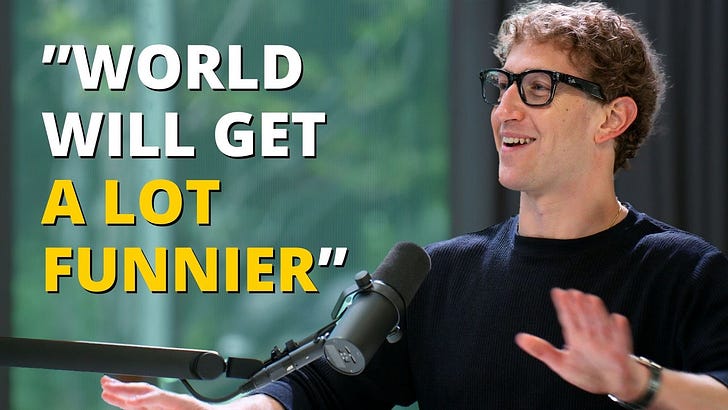When I hear Mark Zuckerberg talk about friends, my heart breaks twice. First it breaks for all the people out there starving for companionship, because Zuck is right—there are so many of them. But then my heart breaks for Zuck himself, who so obviously has no idea what would fix the friend shortage, and can’t help but do things that make it worse.
“The average American I think has…fewer than three friends,” he told podcaster Dwarkesh Patel, “and the average person has demand for meaningfully more.” It would admittedly be nice if we could satisfy that demand with real human interaction: “there are all these things that are better about, kind of physical connections when you can have them. But the reality is that people just don’t have the connection and they feel more alone a lot of the time than they would like.” The way to make up the difference is with a digital companion that “feels like it’s a real person. I think that’s kind of where it’s going. You’ll be able to basically have like an always-on video chat.”
All the lonely people. Where do they all come from? The obvious point is that no one on earth is more famous for degrading the English word “friend” than Mark Zuckerberg. Having turned friendship into an exchange of data on Facebook, he’s now speculating about optimizing that exchange with AI bots. “It almost seems like the arsonist coming back and being the fireman,” said a former Instagram exec.
One of the saddest lines in all of Shakespeare comes at the end of a monologue from Richard II, when the king finds that his allies and subjects have deserted him. Can’t you see, Richard asks his few remaining supporters, “I live with bread like you, feel want, / Taste grief, need friends.” It’s the plaintive simplicity of it, the primitive need. He doesn’t want reverence. He knows he’s lost power. Can’t he at least have love?
Zuck is a little like Richard. He understands and even shares that simple human longing. And he has everything except the simple human means to satisfy it. He can buy anything, engineer anything, calculate anything. And for that very reason he can’t understand the one thing he wants, the one thing you can’t force or game out or simulate, which is real connection.
Mark Zuckerberg may exemplify the social sickness of the digital age. He may have exploited it. But he’s not to blame for creating it. It’s everywhere. Here’s something another technologist, Elon Musk, said this week in reference to his company’s humanoid robot: “Optimus will perform ballet perfectly.” These two statements—that droids can replace friends and that robots can do ballet “perfectly”—are actually the same statement. These are the words of men—the smartest men in the world by some measures, the richest by any—who are trying to replicate something they know everyone wants. But they have no idea what it is.
What would it mean to do ballet “perfectly”? For a robot, it would mean to hit all the poses exactly within a micrometer, landing on each beat within a microsecond. It would mean, in other words, that ballet is a series of tasks to be executed and then marked down as accomplished. I admit I find it extremely funny to think of Musk watching with satisfaction as his life-sized action figure runs through a series of poses, checking each one off the list. Yep. Great job guys. Ballet is over now, we’re done with ballet.
The absurdity of the thought is instructive. Real dance is never finished. Real dance goes on forever. We do the great ones again and again, and every time it’s new, because the person doing it is new. The billionth little girl in a tutu ever to struggle her way through Swan Lake is no less a delight to her parents because Misty Copeland exists. The point of dance is to do it. The point of books is to read them. The point of friends is to be one.
What is friendship? Well, it’s a dance, of course. What do dancers have? They have each other, certainly. But they also have the music. The finest form of friendship, the one most worth having, is the one that draws two people together around some beautiful thing. Fine wines, weird books, pickleball—you love the people who love the same good things as you.
“Being true to themselves, they also remain true to one another,” wrote Aristotle: Friends are drawn first to what they most sincerely love, and only then can they be sincerely drawn to each other. “The typical expression of opening Friendship,” C.S. Lewis observed, “would be something like, ‘What? You too? I thought I was the only one.’”
Now, an AI chatbot, as Zuck quite eloquently pointed out, already knows what you love. At least, it knows what you want. “I think people are going to want a system that knows them well and that kind of understands them in the way that their feed algorithms do,” he said in one interview. It is literally impossible for an AI to love the things you love because, among other reasons, it is too busy fixating on you and your preferences.

The quintessential experience of a great and enduring friendship is discovering someone who has independently come to love what you also love for its own sake. All this is definitionally impossible with a machine designed to gravitate toward things because you love them. Everyone knows that needy clingers tragically repel the people they most want to befriend by automatically imitating whatever interests their targets express. This is why.
Cicero wrote that “the power of friendship is that it makes, as it were, one soul out of many.” Well the power of AI is that it makes, as it were, a mirror reflecting one soul back at itself, forever. It is incalculably sad to watch people trying to pass off one as the other. It won’t work. And it will probably make things worse.
It is also—brace yourself—morally wrong. I know we’re not supposed to talk about that sort of thing, but I’m going to anyway, so I’ll put it below the paywall.
Keep reading with a 7-day free trial
Subscribe to Rejoice Evermore to keep reading this post and get 7 days of free access to the full post archives.



